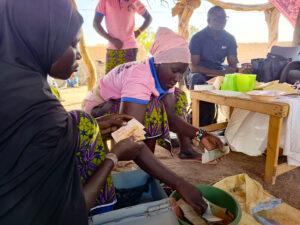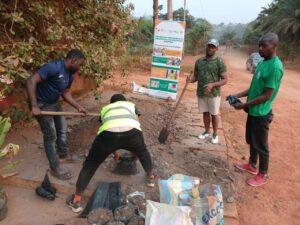![]() From March 13 to 15, 2024, Inades-Formation Burundi took delivery of 400 goats (360 goats and 40 billy goats) to women and men producers supported under the TAPSA II program (Transition vers Agroécologie Paysanne au service de la Sécurité Alimentaire) financed by the Comité Catholique contre la Faim et pour le Développement “CCFD-Terre Solidaire” and the Agence Française de Développement “AFD”.
From March 13 to 15, 2024, Inades-Formation Burundi took delivery of 400 goats (360 goats and 40 billy goats) to women and men producers supported under the TAPSA II program (Transition vers Agroécologie Paysanne au service de la Sécurité Alimentaire) financed by the Comité Catholique contre la Faim et pour le Développement “CCFD-Terre Solidaire” and the Agence Française de Développement “AFD”.![]()
 This activity took place in Province Kirundo, Commune Bugabira, colline Nyamurenge and Province Mwaro, Commune Ndava, Colline Rugasa and strengthens the practices of agricultural producers to achieve an integral and integrated territory.
This activity took place in Province Kirundo, Commune Bugabira, colline Nyamurenge and Province Mwaro, Commune Ndava, Colline Rugasa and strengthens the practices of agricultural producers to achieve an integral and integrated territory.
Procedurally, the Ministry of the Environment, Agriculture and Livestock (MINEAGRIE) has made available a technical team made up of executives from the General Livestock Directorate.
They supported the Inades-Formation Burundi team at every stage, from selection to receipt and distribution of the animals to the beneficiaries.
On arrival in the field, the selected goats were vaccinated against Peste des Petits Ruminants (PPR) before being transported to the reception area.  Only goats showing no signs of disease were received and then handed over to the eagerly awaiting beneficiaries.
Only goats showing no signs of disease were received and then handed over to the eagerly awaiting beneficiaries.
![]()
![]() The local administration, the representative of Inades-Formation Burundi, the representative of the Direction Générale de l’Elevage team, the deconcentrated technical services of the MINEAGRIE at provincial level and
The local administration, the representative of Inades-Formation Burundi, the representative of the Direction Générale de l’Elevage team, the deconcentrated technical services of the MINEAGRIE at provincial level and  commune in charge of livestock took turns to speak. They gave advice on hygiene and nutrition to the chosen individuals, so that present and future generations could benefit.
commune in charge of livestock took turns to speak. They gave advice on hygiene and nutrition to the chosen individuals, so that present and future generations could benefit.
To achieve this, a system of solidarity chains has been set up around goat breeding. The first buyers give birth to the next, and so on. The chain will have to be maintained in order to gradually reach a large workforce over time.
A close monitoring mechanism has been set up. For example, all purchasers are electronically recorded, along with the number of animals received, with photos, through KoboCollect.
![]() In this way, everyone is grouped together in associations with bodies that will each provide reports on their progress. Direct supervision is carried out by field technicians.
In this way, everyone is grouped together in associations with bodies that will each provide reports on their progress. Direct supervision is carried out by field technicians.
 What’s the breakdown? 360 goats and 40 billy goats were granted to TAPSA II beneficiaries, at a rate of 2 goats per producer, i.e. 200 beneficiaries. The 40 billy goats are shared by all goat beneficiaries at a ratio of one billy goat for every 4 goats.
What’s the breakdown? 360 goats and 40 billy goats were granted to TAPSA II beneficiaries, at a rate of 2 goats per producer, i.e. 200 beneficiaries. The 40 billy goats are shared by all goat beneficiaries at a ratio of one billy goat for every 4 goats.
 Finally, the beneficiaries expressed their delight. They reiterated their determination and commitment to the hygiene and feeding of the animals they received. They hope that the use of organic fertilizer will increase agricultural production, thereby improving their standard of living.
Finally, the beneficiaries expressed their delight. They reiterated their determination and commitment to the hygiene and feeding of the animals they received. They hope that the use of organic fertilizer will increase agricultural production, thereby improving their standard of living.
Published by Richard HAVYARIMANA,
Advocacy and Communication Officer











